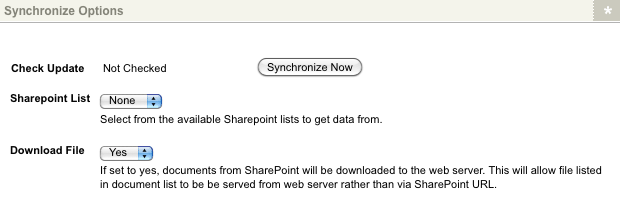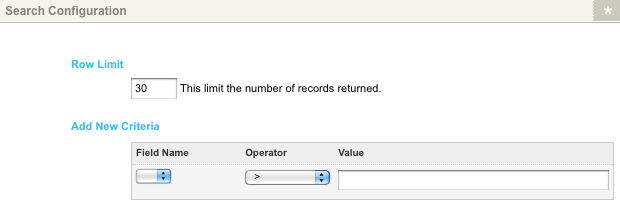SharePoint saved search
The SharePoint saved search asset allows you to configure a set of SharePoint search criteria in Matrix, storing and updating the results of the search on the system. These results are stored as data source record set shadow assets and can be used with other Matrix assets to provide additional SharePoint functionalities.
| A SharePoint saved search should be created within a site with an assigned URL. SharePoint saved search assets without a URL will not function correctly. |
Once created, you can configure the settings of your SharePoint saved search on its associated asset screens. These screens are often the same or similar to those for a standard page and are described in the Asset screens documentation. This documentation will describe the details and search configuration screens, which are different for a SharePoint saved search.
Details screen
The Details screen of a SharePoint saved search allows you to configure the asset.
Read the Asset screens documentation for more information about the Status, *Future status, Thumbnail and Details sections.
Connection setup
This section allows you to configure the connection to the SharePoint system, creating a SharePoint bridge for the saved search.
The fields available in this section are as follows:
- WSDL URL
-
Enter the URL of the SharePoint system.
- Username
-
Enter the username used to connect to the SharePoint system.
- Password
-
Enter the password used to connect to the SharePoint system. This password must Be entered twice for validation purposes.
- Authentication method
-
Select the authentication method to use to connect to the SharePoint system. The options available are:
- HTTP basic
-
Uses basic HTTP authentication.
- NTLM
-
Uses NTLM authentication.
Synchronize options
This section allows you to manage the results of the SharePoint saved search. the Synchronize options section of the Details screen is shown in the figure.

The fields available are as follows:
- Check update
-
This field allows you to check the record set results of the saved search for any new updates, synchronizing them accordingly. The Synchronize button will update the saved search results if any updates are found. Once this is done, the message:
Successfully synchronizedwill be displayed. - SharePoint list
-
Select a SharePoint list to determine where the saved search will source its data results. SharePoint lists will only be available once a SharePoint connection has been established and committed in either the Connection setup or Use a connector asset sections. If no lists are available, this field will read
None. - Download file
-
Select whether the SharePoint documents returned from the saved search will be downloaded to your web server. This is useful when providing downloads for users so that the document’s URL does not display the path to your SharePoint system. By default, this field is set to Yes.
Use a connector asset
This section allows you to select a SharePoint connector with a configured connection to the SharePoint system for the saved search. The Use a connector asset section of the Details screen is shown in the figure.

In the SharePoint connector asset field, select a configured SharePoint connector to use as the connection for the saved search.
| If a SharePoint connector has been selected in the SharePoint connector asset field, the Connection setup section fields will have no effect and, therefore, do not need to be completed. |
Record set asset names
This section allows you to select how the record set results appear in the asset tree. the Record set asset names section of the Details screen is shown in the figure.

In the Record set asset names field, enter a string to use as the asset name for the record set results of the saved search.
Keyword replacements can be used in this section.
For example, if the keyword replacement is entered into this field, the record set assets will be named after their modification date, such as 2009-01-01 09:12:53.
If this field is left blank, the record sets will be named data source record set <assetid>.
Available keywords
This section lists the available keyword replacements for record set assets of a saved search determined by the attributes of the record sets in the SharePoint system. These keyword replacements can be used in the Record set asset names field or when listing the saved search results on a SharePoint record listing.
Read the List SharePoint saved search results on an asset listing page example for more information.
| These keyword replacements will differ depending on the available attributes of the SharePoint list and, as a result, they will only appear once a SharePoint connection has been established and committed in either the Connection setup or Use a connector asset sections, and a SharePoint list has been selected. When a SharePoint saved search is first created, the Available keywords field will read: |
No keywords available – this data source, as currently configured, does not have any record sets.

Search configuration screen
The Search configuration screen determines the search options for the SharePoint saved search.
Search configuration
This section determines the number of records returned and allows you to add new search criteria to the saved search. the Search configuration section of the Search configuration screen is shown in the figure.

You can define the search options using the following fields:
- Row limit
-
Enter the maximum number of record set assets that will be listed as results of the saved search. For example, if
10is entered into this field, only the first ten results will be listed. By default, 30 is entered into this field. - Add new criteria
-
Select criteria to further configure the saved search results using a relational operator. Records will be listed if the set criteria rules are satisfied.
Criteria must be synchronized using the Synchronize now button on the Details screen before it is applied to the results of the saved search.
The following fields are available in this section:
- Field name
-
Select the field to be used as a comparison criterion. The value of this field will be Compared to the value entered in the Value field, using the comparison operator.
- Operator
-
Select the relational operator to use when comparing the entered value to the Selected field.
The following options are available:
-
> (Greater than): The criterion will be met if the selected field is greater than the Value.
-
>= (Greater than or equal to): The criterion will be met if the selected field is greater than or equal to the value.
-
< (Less than): The criterion will be met if the selected field is less than the value.
-
⇐ (Less than or equal to): The criterion will be met if the selected field is less than or Equal to the value.
-
== (Equal to): The criterion will be met if the selected field is equal to the value.
-
!= (Does not equal): The criterion will be met if the selected field does not equal the Value.
-
Contains: The criterion will be met if the selected field contains the value.
-
BeginsWith: The criterion will be met if the selected field begins with the value.
-
IsNotNull: The criterion will be met if the selected field contains a valid value. the Value field is not used when using this operator.
-
IsNull: The criterion will be met if the selected field does not contain a valid value. the Value field is not used when using this operator.
-
- Value
-
Enter the value that will be compared to the selected field using the comparison operator. For example, if a criterion was created as
Level == (Equal to) 1, only level one records will be listed in the saved search.
If multiple criteria are set, all criteria rules must be satisfied within the saved search results.
Data source record set
SharePoint records found as results of the saved search are displayed as data source record set asset under the SharePoint saved search asset in the asset tree.
Read the Asset screens documentation for more information about the Status, Future status and Thumbnail sections.
User details
This section displays the details of the record set. the User details section of the Details screen is shown in the figure.

| SharePoint documents specified as data source assets in Matrix are updated and downloaded automatically by the update SharePoint cron job, set to run on a nightly basis. |